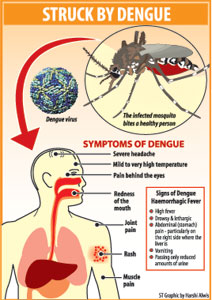A tiny bite, sometimes even without the knowledge of the victim, and 2-7 days later the child is down with dreaded dengue.
Dengue is a viral disease transmitted by the bite of an infected mosquito, says Consultant Paediatrician Dr. Padmakanthi Wijesuriya of the Lady Ridgeway Hospital for Children, explaining that the virus has four serotypes or strains – Dengue 1, 2, 3 and 4. It is the Aedes female mosquito which spreads all the strains.
Anyone can get any strain and, unfortunately, the victim becomes immune only to that strain, MediScene understands.
The second or third attack by different strains will have an “exaggerated reaction”, stresses Dr. Wijesuriya, adding that usually the first attack of dengue will take the form of Dengue Fever with subsequent ones taking the more dangerous form of Dengue Haemorrhagic Fever which could be fatal.
Each strain can cause either Dengue Fever or Dengue Haemorrhagic Fever, it is learnt.
The symptoms of both Dengue Fever and Dengue Haemorrhagic Fever are mild to very high temperature, severe headache, pain behind the eyes, muscle and joint pain and rash, she says, adding that there could also be redness of the mouth and redness of the body.
Usually, in other infections when the fever comes down the child would perk up and look better, but not so in dengue.
The fever could last from two to seven days and in some patients subside without complications but in others leave red (bleeding) spots on the body.
It is important to give the child adequate fluids, not only water but also liquids such as fruit juices and milk to build up his calories and energy, while monitoring his urine output, it is learnt. Red foods or drinks should be avoided, according to Dr. Wijesuriya, because if the child vomits, it is important to know whether it is stained with blood. Red foods and liquids would make it difficult to differentiate what it is.
If the fever has not settled by the third day and the child is lethargic and sickly, go to a doctor who will order a blood test, she says. (See box)
Not responding
to paracetamol? |
A sign that your child may be having dengue is if the response of the fever to paracetamol is very poor, unlike in other infections, MediScene understands.
Beware and don’t try to bring the fever down at any cost by giving other medications, especially anti-inflammatory drugs, warns Dr. Wijesuriya because they can do more harm than good.
In many instances, she points out, fever does not cause harm. Sometimes febrile convulsions (fits) could occur if the fever is high but that too only on the first day and rarely after that. |
Watch out for signs of Dengue Haemorrhagic Fever, Dr. Wijesuriya urges parents.
The danger signals will be abdominal (stomach) pain, particularly on the right side where the liver is, vomiting and passing only reduced amounts of urine.
“A clear sign of Dengue Haemorrhagic Fever will be if the child -- particularly his limbs – is cold to the touch, he is very drowsy and lethargic and refuses food and drink,” she stresses.
Don’t waste a moment but rush the child to the nearest hospital because if it is Dengue Haemorrhagic Fever, fluid leakage within the body begins after Day 2. This is the time the platelet count will start coming down and the PCV will go up.
Dengue Haemorrhagic Fever can affect one or more organs, warns Dr. Wijesuriya, adding that if it is one the chances of survival are 50% and if it is two or more just 10%.
The strong message from Dr. Wijesuriya is: Don’t delay, don’t take a chance – take the child to hospital.
Low WBC, indicator of disease
If a blood test on Day 3 indicates that the total white blood cell (WBC) count is low (below 4,000) then the diagnosis will point towards dengue, it is learnt.
Usually, Dr. Wijesuriya says, the platelet and packed cell volume (PCV) counts would still be normal on the third day.
A special test that can confirm the disease is the Dengue PCR, carried out only at specialized centres and quite costly, she says. This has to be done when the child is running a fever. If the fever is down, it will be negative.
Struck by dengue: Inform others
If your child is diagnosed as having dengue, immediately inform your neighbours and his/her school, urges Dr. Wijesuriya.
This is the best public service you can do because then the neighbourhood and school premises can be cleaned up, without awaiting the intervention of the authorities, and the spread of dengue curbed.
It will be the primary prevention measure in the affected area, she adds.
|

